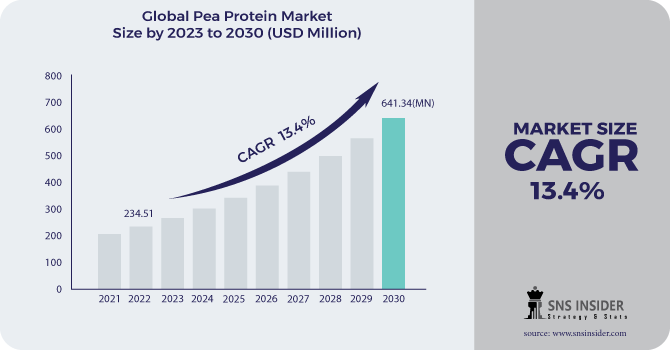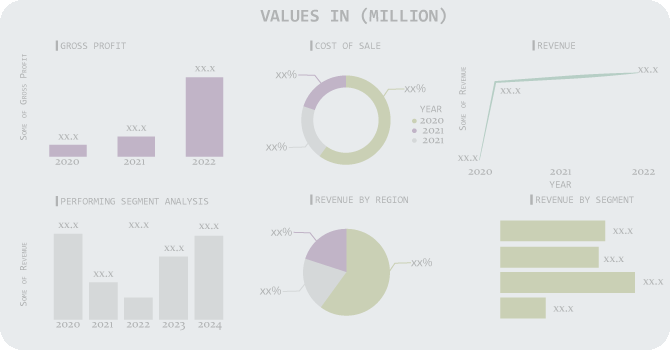Pea Protein Market Report Scope & Overview:
The Pea Protein Market Size was esteemed at USD 234.51 million out of 2022 and is supposed to arrive at USD 641.34 million by 2030, and develop at a CAGR of 13.4% over the forecast period 2023-2030.
Pea protein is viewed as a non-allergenic part. It's sans lactose and without gluten by definition. Lactose prejudice is turning out to be more normal across the world, and more individuals are staying away from gluten-based items. Vegetarian buyers depend on plant-based protein to satisfy their dietary requirements consistently. Therefore, rising customer interest for sans allergen items can be credited to high pea protein segregate interest. Subsequently, pea protein is turning out to be more well-known, as there are fewer individuals who are hypersensitive to peas. Subsequently, pea protein producers have a gigantic open door in the allergen-unregulated economy space.

Get E-PDF Sample Report on Pea Protein Market - Request Sample Report
Pea protein contains every one of the fundamental amino acids expected for sound body capability. It assists with further developing blood dissemination and calcium retention, weight the board, helps digestion, keeps up with sound muscle, and controls glucose. Pea protein is 100 percent vegetarian and sans lactose and is alright for individuals with sensitivities or aversions to dairy and eggs. Hence, veggie lovers and vegetarians favor pea protein items over supplements with protein got from dairy, like casein, whey protein, eggs, or meat.
Field peas offer significant benefits to purchasers, and to ranchers as their creation is harmless to the ecosystem while being an extraordinary wellspring of protein, with various applications in sans dairy food varieties, vegan food sources, meat analogs, sports and thinning food sources, seniors’ nourishment, and clinical sustenance items. Burcon's Peazazz pea protein has extraordinarily clean flavor qualities and is appropriate for use in refreshments, dairy elective items, feast substitutions, and meat analogs, as well as an assortment of other sound and extraordinary tasting food and drink item applications.
Market Dynamics:
Driving Factors:
-
Developing vegetarian populace and notoriety of plant-based items.
-
Improved well-being awareness.
Restraining Factors:
-
Cost inadequacy of unrefined substance.
-
The pattern of living involving pea protein in different items.
Opportunities:
-
Low buyer mindfulness about the pea protein-based items.
-
Expanding center around advancement and improvements of better pea protein removes and items.
Challenges:
-
Supply limitation because of unsound pea creation.
-
Definition challenges in pea protein items.
Impact of COVID-19:
The rising tendency towards wellbeing and prosperity during the Covid pandemic episode would possibly set off the development of pea protein seclude market through the examination time period. In any case, disturbance in the production network would possibly block the market development during 2020 and today. Huge development in enlistment in wellness clubs during the pandemic stage would additionally represent development in the general market.
Market Estimations:
By Application:
Pea protein is added to nourishing cocktail syrups, tablets, energy powders, oat bars, and soups by virtue of different medical advantages, like muscle development, bone wellbeing improvement, and managed glucose levels. Rising medical issues, like stoutness and diabetes, have prompted a shift towards veggie lover dietary propensities. Creature raising eminently affects the regular assets of the planet and is liable for an unnatural weather change somewhat. Pea protein offers great finishing properties that are supposed to advance its application in the creation of meat items, including sheep, chicken, sheep, and hamburgers.
By Product:
Segregates are broadly utilized as nourishing enhancements in plant-based meat items, caffeinated drinks, organic product blends, and bread shop things as they have great emulsification and non-unfavorably susceptible attributes. Pea protein concentrates have a few credits, for example, great emulsification and high edibility, which drive their usage in weight control and dietary enhancement applications. Besides, these concentrates are steadily integrated into pastry shop items, like cakes and baked goods, for good enhancement and dry surface. Finished pea protein is utilized as a finishing specialist in meat items, heated merchandise, and sweet shop things. Also, the presence of the stringy substance in finished pea protein is supposed to advance they are joining in energy powders and organic product juice blends. Rising hamburger creation limit in China, India, and Australia by virtue of developing homegrown interest is supposed to help the utilization of finished pea protein over the estimated years.
Market Segmentation:
By Product:
-
Isolates
-
Concentrates
-
Textured
-
Hydrolysate
By Application:
-
Meat Substitutes
-
Dietary Supplements
-
Beverage
-
Others
.png)
Get Customized Report as per Your Business Requirement - Request For Customized Report
Regional Analysis:
-
North America
-
USA
-
Canada
-
Mexico
-
-
Europe
-
Germany
-
UK
-
France
-
Italy
-
Spain
-
The Netherlands
-
Rest of Europe
-
-
Asia-Pacific
-
Japan
-
south Korea
-
China
-
India
-
Australia
-
Rest of Asia-Pacific
-
-
The Middle East & Africa
-
Israel
-
UAE
-
South Africa
-
Rest of Middle East & Africa
-
-
Latin America
-
Brazil
-
Argentina
-
Rest of Latin America
-
Topographically, the pea protein market is divided into North America, Europe, Asia-Pacific, Latin America, and the Middle East and Africa. North America is assessed to represent the biggest portion of the general pea protein market. North America's unmistakable situation in the pea protein market is basically credited to the deeply grounded food and refreshment industry, rising worries over creature items and protein, expanding vegetarian populace, developing inclination for meat choices, expanding interest for sound and nourishing items, enormous pea creation, and huge presence of pea protein makers.
Be that as it may, the Asia-Pacific locale is supposed to develop at the most elevated CAGR during the estimated time frame. The fast development of this locale is predominantly credited to the rising protein-rich eating regimen mindfulness, expanding wellbeing cognizance, blasting food and drinks industry, quick urbanization, an enormous base of veggie lover populace, and expanding new item dispatches containing pea protein.
Key Players:
A&B Ingredients, Glanbia, Plc., Nutri-Pea Limited, Sotexpro SA, Axiom Foods, Inc., Farbest Brands/Farbest-Tallman Foods Corporation, Roquette Freres Le Romarin, Burcon Nutrascience Corporation, Cosucra Groupe Warcoing SA, and Shandong Jianyuan Foods Co., Ltd.
Nutri-Pea Limited-Company Financial Analysis

| Report Attributes | Details |
|---|---|
| Market Size in 2022 | US$ 234.51 Million |
| Market Size by 2030 | US$ 641.34 Million |
| CAGR | CAGR 13.4% From 2023 to 2030 |
| Base Year | 2022 |
| Forecast Period | 2023-2030 |
| Historical Data | 2020-2021 |
| Report Scope & Coverage | Market Size, Segments Analysis, Competitive Landscape, Regional Analysis, DROC & SWOT Analysis, Forecast Outlook |
| Key Segments | • by Product (Hydrolysate, Isolates, Concentrates, Textured) • by Application (Meat Substitutes, Dietary Supplement, Bakery Goods) |
| Regional Analysis/Coverage | North America (USA, Canada, Mexico), Europe (Germany, UK, France, Italy, Spain, Netherlands, Rest of Europe), Asia-Pacific (Japan, South Korea, China, India, Australia, Rest of Asia-Pacific), The Middle East & Africa (Israel, +D11UAE, South Africa, Rest of Middle East & Africa), Latin America (Brazil, Argentina, Rest of Latin America) |
| Company Profiles | A&B Ingredients, Glanbia, Plc., Nutri-Pea Limited, Sotexpro SA, Axiom Foods, Inc., Farbest Brands/Farbest-Tallman Foods Corporation, Roquette Freres Le Romarin, Burcon Nutrascience Corporation, Cosucra Groupe Warcoing SA, and Shandong Jianyuan Foods Co., Ltd. |
| Drivers | •Developing vegetarian populace and notoriety of plant-based items. •Improved well-being awareness. |
| Market Challenges | •Supply limitation because of unsound pea creation. •Definition challenges in pea protein items. |

